 February 13, 2010 - Inhaling other people's tobacco smoke can have a serious impact on a developing baby, scientists have confirmed, sounding a new alarm for mothers-to-be.
February 13, 2010 - Inhaling other people's tobacco smoke can have a serious impact on a developing baby, scientists have confirmed, sounding a new alarm for mothers-to-be.
Canadian scientists pooled the results of 76 independent studies, conducted around the world, which had sought to probe different aspects of the impact of passive smoking on a developing child. It totalled to a sample group of 48,500 women who had been exposed to environmental tobacco smoke during their pregnancy and a comparable group of almost 91,000 women who had not.
Passive smoking during pregnancy carries many of the risks associated with active smoking, this major review of the scientific literature has found. The Canadian study found women exposed to environmental tobacco smoke had "increased risks of (having) infants with lower birth weight, congenital anomalies, longer lengths, and trends towards smaller head circumferences". Action on Smoking and Health (ASH) Australia said it was further evidence of the impact of passive smoking, and of the need to continue to roll out legislated smoke-free spaces for people who don't have the bad habit. "This new study shows babies are not just at risk if their mother smokes, but also if she's exposed to the smoke of others at work, home or public places," ASH chief executive Anne Jones said in a statement on Friday. "Pregnant women are most at risk in licensed and entertainment venues, such as pubs, clubs and casinos and any other workplaces where legal requirements for safe, smoke-free workplaces are ignored."
Action on Smoking and Health (ASH) Australia said it was further evidence of the impact of passive smoking, and of the need to continue to roll out legislated smoke-free spaces for people who don't have the bad habit. "This new study shows babies are not just at risk if their mother smokes, but also if she's exposed to the smoke of others at work, home or public places," ASH chief executive Anne Jones said in a statement on Friday. "Pregnant women are most at risk in licensed and entertainment venues, such as pubs, clubs and casinos and any other workplaces where legal requirements for safe, smoke-free workplaces are ignored."
Australia's major casinos continue to operate smoking-allowed "high-roller" rooms with government approval. "Some governments, including New South Wales (NSW), are still granting exemptions that allow staff and patrons including pregnant women to be exposed to tobacco smoke on a regular basis," Mrs Jones said. "Other high-risk public places include crowded outdoor dining and drinking areas, building entrances and transport waiting areas."
Smoking-related changes were evident across key indicators of the childrens' overall health, though duration of gestation and the number of pre-term deliveries were roughly the same.
Reference: Passive smoking also bad for baby: study, DANNY ROSE - Australian Associated Press (AAP), The Sydney Morning Herald, 2/12/2010.
A few related news briefs:
Pregnant women exposed to passive smoke greater chance of child will have respiratory distress..;
Kids apt to smoke if mom did while pregnant..;
Tobacco a threat to pregnant women and children in developing world...
Read more...
Bringing the World of Tobacco Control closer together..
Australia - second hand smoke serious impact on developing baby..
Czech Republic - Philip Morris decides not to pass on tax increase to smokers..


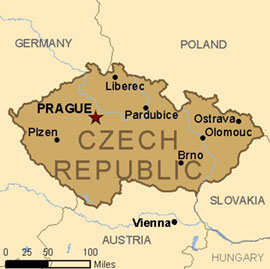 February 13, 2010 - On January 1, 2010 an excise tax hike on tobacco went into effect should have led to a 2.50 Kč (13 U.S. cents) price increase per pack of cigarettes. However, many smokers are unlikely to see an increase in the price of their preferred brand due to the decision of one Czech tobacco industry leader.
February 13, 2010 - On January 1, 2010 an excise tax hike on tobacco went into effect should have led to a 2.50 Kč (13 U.S. cents) price increase per pack of cigarettes. However, many smokers are unlikely to see an increase in the price of their preferred brand due to the decision of one Czech tobacco industry leader.
Philip Morris, the largest tobacco distributor on the Czech market, has decided not to pass on the tax increase to smokers of its flagship brand, Marlboro, but will pay the tax themselves. The Czech Republic's most popular brand of cigarette is  , produced and distributed by Philip Morris. Other premium cigarette manufacturers are unlikely to raise their prices as a result.
, produced and distributed by Philip Morris. Other premium cigarette manufacturers are unlikely to raise their prices as a result.
Philip Morris will increase the price of its non-premium cigarettes, however, according to Andrea Gontkovičová, director of corporate affairs for Philip Morris Czech Republic, but there will be a delay before existing stocks with lower excise tax stamps are sold and the more expensive cigarettes hit stores, she said.
The EU has called for further excise tax increases of 90 euros per 1,000 cigarettes before 2014, which will lead to an approximate increase of 12 Kč per pack in the Czech Republic, depending on the exchange rate, said Kamil Provazník, executive at Imperial Tobacco Czech Republic.(European Union - agrees to raise the minimum tax on tobacco products sold in the region..)
Due to the highly competitive nature of the Czech cigarette market, of which five companies hold 95 percent dominance, smaller cigarette manufacturers - such as Imperial Tobacco, which produces and distributes Davidoff, Rizla and Gauloises, among others - are forced to follow Philip Morris' lead on pricing. Imperial Tobacco, No. 3 on the Czech market, will not increase prices on most brands of cigarettes this year as a result of Philip Morris' decision, explained Provazník.
The 2010 tax hikes come just two years after the largest tobacco excise tax increase in history raised prices an average of 6 Kč per pack. As prices continue to increase, many smokers are switching to cheaper brands and loose tobacco, meaning that every crown counts for tobacco producers.
One unintended consequence of rising European tobacco taxes has been the increase of counterfeit branding and illegal smuggling of cigarettes from East European countries not subject to EU tax laws. EU agents recovered almost 750 million contraband cigarettes in 2009, including 8,500 cartons of Ukrainian cigarettes Austrian police discovered in a truck driven by a Czech man June 26. Such activity is bound to increase as excise taxes continue to swell, according to Lászlo Kovács, EU commissioner for taxation.
Reference: Cigarette tax affects budget brands EU mandates push up price tag for nonpremium smokers, by Stephan Delbos - Staff Writer, The Prague Post, 2/10/2010.
Related news brief:
Czech Republic - crackdown on tobacco use long way off..;
Czech Republic - new penal code weakens laws against illegal cigartte production..;
Czech Republic - pubs and restaurants allow smoking or Do NOT allow smoking..;
Czech children worst in cigarette smoking in world..;
Czech Republic - Philip Morris profits dropping 2-years in a row..
South Carolina - candidates disagreed on whether to raise cigarette tax..
 February 13, 2010 - Five candidates for governor disagreed on whether to raise the state's lowest-in-the-nation cigarette tax - and how to spend the money - at a Friday debate
February 13, 2010 - Five candidates for governor disagreed on whether to raise the state's lowest-in-the-nation cigarette tax - and how to spend the money - at a Friday debate
The debate, sponsored by the S.C. Hospital Association, was a focused, substantive discussion on issues ranging from tort reform, mental health care funding, health care agency restructuring and how to entice doctors to practice in rural areas.
The hospital association has for years lobbied to raise the state cigarette tax and use the revenue to pay for health care for low-income residents, and state schools Superintendent Jim Rex and state Attorney General Henry McMaster had a dust-up last weekend about the tax.
The three Democrats, attorney and former lobbyist Dwight Drake, Rex and state Sen. Vincent Sheheen, D-Kershaw, all favored raising the tax while Republican McMaster did not. Republican Lt. Gov. Andre Bauer said he would like any cigarette tax increase to include an equal tax cut.
But the three Democrats differed on how to spend the money, with Rex proposing a larger tax increase to the national average of $1.34 a pack - to fund health care, agriculture marketing, cessation programs and prevent teacher furloughs. Sheheen, the only person in the debate to vote to raise the cigarette tax, said he would put the money into health care, calling the decade-long failure to raise the 7-cents-a-pack tax shameful. Drake, a former lobbyist for the country's largest tobacco company, said it was politically impossible to raise the tax to the national average, and touted a smaller 50-cent-a-pack increase.
"It's not right to tell someone you're going to do something that can't be done," Drake said.
As he has for several weeks, Bauer said the state needs to wean residents from public services such as health care. When asked about the lack of funding for mental health services patients who are often treated in hospital emergency rooms Bauer said the state needs to break the cycle.
"At what point are we going to say enough is enough?" Bauer asked.
Sheheen said he would protect the Department of Mental Health's budget and push for more low-cost ways to treat patients before they become ER problems, including psychiatric services by telephone. Rex said the cigarette tax could pay for mental health care.
McMaster said ERs should be protected from lawsuits if they turn away mental health patients.
The candidates were split on whether, and how, to restructure state health care agencies.
Bauer, Drake and Sheheen wanted to add the Department of Health and Environmental Control to the governor's cabinet. Most agreed restructuring was not a cure-all and said an effective governor could improve those agencies.
The candidates were also split on two leading legal changes to bring down the cost of health care: nonbinding arbitration of disputes, and requiring the loser in lawsuits to pay the costs.
All the candidates supported arbitration, but only Sheheen and Bauer would require those who lost cases to pay the costs. When asked if the state should provide incentives to doctors who promise to practice in rural areas, all but McMaster supported the idea.
McMaster questioned how the state would pay for the incentives.
Reference: Cigarette tax dominates debate
by JOHN O'CONNOR (joconnor@thestate.com), The State, 2/13/2010.
Related news briefs:
South Carolina - among the worst states in the nation in smoking prevention efforts..;
South Carolina - most residents support raising the tobacco tax..;
South Carolina - with Gov. Sanford still in office most likely no tobacco tax increase in 2010..;
South Carolina - low cigarette pricing, smuggling, higher insurance premiums, etc..;
Lexington County, South Carolina has a workplace smoking ban..;
South Carolina - governor disappears, maybe its time to slip through a cigarette tax..;
South Carolina - next legislative session starts June 16th..;
South Carolina - lawmakers may disappoint again on cigarette tax increase..;
SC tobacco tax increase - doubt exists maybe NOT this year..;
South Carolina - can we expect a tobacco tax increase this year??;
South Carolina a magnet for cigarette black market..;
South Carolina - legislators eager to pass cigarette tax increase - the odds are against them??;
South Carolina to spend NO money on tobacco prevention..;
South Carolina (SC) will NOT devote any resources to anti-smoking programs..;
In 2008 will the politicians do what's right for the State of South Carolina??;
South Carolina - Tobacco Tax Increase Killed - State House Fails to Override Governor's Veto..
Tobacco Tax Increase – What’s Wrong with South Carolina??
Read more...
WHO's Global Adult Tobacco Survey - RESULTS..
 February 12, 2010 - The results of a survey on adult tobacco use around the world were unveiled in Uruguay yesterday, the first country in Latin America to ban smoking in the workplace and in enclosed public spaces. The World Health Organization’s (WHO) Global Adult Tobacco Survey (GATS) was administered in the 15 countries with the highest number of smokers per capita, but Uruguay was included because of its government’s dedication to curbing smoking. Uruguayan President Tabaré Vázquez, a trained oncologist, attended.
February 12, 2010 - The results of a survey on adult tobacco use around the world were unveiled in Uruguay yesterday, the first country in Latin America to ban smoking in the workplace and in enclosed public spaces. The World Health Organization’s (WHO) Global Adult Tobacco Survey (GATS) was administered in the 15 countries with the highest number of smokers per capita, but Uruguay was included because of its government’s dedication to curbing smoking. Uruguayan President Tabaré Vázquez, a trained oncologist, attended.
Uruguay’s Public Health Minister María Julia Muñoz said at the ceremony that the number of people in Uruguay who smoke every day had decreased by 24 percent in the last few years. But while 48 percent of adults apparently tried to stop smoking in the past year, only 8 percent succeeded.
In addition to the bans that were passed in March of 2006, Uruguay has since fought smoking by raising cigarette prices and requiring cigarette advertisements to devote half of their ad space to publicizing the dangers of smoking. Other Latin American countries, including Brazil and Colombia, have also banned smoking in indoor public places in the past year.
The forthcoming issue of Americas Quarterly—to be released on February 17—will unveil a statistical snapshot of the degree to which countries in the hemisphere are smoke free and the corresponding smoking prevalence among adults.
GATS is the global standard for systematically monitoring adult tobacco use (smoking and smokeless) and tracking key tobacco control indicators.
More - Tobacco in Uruguay..
Reference: Global Tobacco Survey Findings Released in Montevideo, Uruguay, America Quarterly (AQ) Online, 2/10/2010.
Related news briefs:
Bangladesh - nearly 70 percent of current smokers are planning to quit..;
Thailand - GATSurvey - 98.6% of adults believe smoking causes serious illness..
Read more...
In process: PMI - q4 2009 and full year..
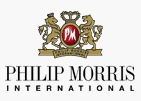
February 12, 2010
PHILIP MORRIS INTERNATIONAL INC. (PMI) REPORTS 2009 RESULTS
Philip Morris International Q4 2009 Earnings Call Transcript, Seeking Alpha, 2/11/2010.
PMI’s tobacco product shipments flat
Feb 12, 2010—Philip Morris International’s cigarette shipment volume last year, at 864.0 billion, was down by 0.7 per cent on that of the previous year.
Gains in the company’s Asia region, primarily driven by Indonesia and double-digit growth in Korea, and in its Latin America & Canada region, because of the acquisition of Rothmans, Canada, were more than offset by declines in the EU and its EEMA [Eastern Europe, Middle East and Africa] region, mainly due to the impact of the economic crisis, primarily in the Baltic States, Spain and Ukraine.
Excluding acquisitions, PMI’s cigarette shipment volume was down by 1.5 per cent.
The combination of stubbornly high unemployment levels, lower discretionary incomes and tax induced pricing took their toll on volumes. Most notably in Spain, Ukraine, the Baltics, Romania, Serbia and Columbia. Which all suffered extraordinary double digit contractions.
Total shipments of Marlboro cigarettes, at 302.0 billion, were down by 2.8 per cent, primarily due to market declines in the EU and EEMA, largely as a result of the effects of the economic crisis in Spain and a softening of the premium segment in Russia and Ukraine, offset by strong growth of 4.3 per cent in Asia.
Total shipments of L&M cigarettes, at 90.8 billion, were down by 1.7 per cent, with growth of 8.6 per cent in the EU offset primarily by a decline in Russia.
There was better news for other tobacco products (OTP), total shipments of which, in cigarette equivalent units, grew by 33.2 per cent, primarily fueled by the acquisition of Swedish Match South Africa.
But excluding acquisitions, shipments of OTP were down by 8.1 per cent, primarily due to lower cigarillo volumes in Germany, where the segment has declined, and the impact in Poland of the excise tax alignment of pipe tobacco to roll-your-own products in the first quarter of 2009.
Total shipments of cigarettes and OTP were essentially flat during 2009, but down by 1.6 per cent excluding acquisitions.
PMI’s market share performance registered a stable or growing trend in a number of markets, including Algeria, Argentina, Australia, Austria, Belgium, Brazil, Bulgaria, Canada, the Canary Islands, the Dominican Republic, Egypt, Finland, Greece, Hungary, Japan, Korea, Mexico, the Netherlands, the Philippines, Portugal, Romania, Russia, Spain, Turkey, Ukraine and PMI Duty Free.
While the premium segment suffered significant erosion in several markets, and most notably in Spain, Russia and Germany, it held up remarkably well in markets as varied as Turkey and the Ukraine. And in the quarter, actually, sustained its growth momentum in markets such as Argentina, Indonesia, Korea, Poland and Greece.
The disciplined roll out of Marlboro’s new brand, Architecture continued the pace as the year unfolded. While the brand’s overall volume performance suffered from the market contraptions that occurred primarily in the European Union and in Eastern Europe, it faired remarkably well in numerous markets. Volume growth of 4.3% in Asia was particularly note worthy with solid market share performances in Japan, Korea, Indonesia and the Philippians.
In Japan, the government has called for a 70 yen per pack of 20 cigarettes or 40% excise tax increase effective October 2010. And Parliamentary approval is excepted to be secured by the end of March. Apart from taking into account sales taxes and current trade margin levels, implies a minimum price increase of 82 yen per pack of 20 cigarettes, to remain revenue neutral and per stick basis.
PMI’s cigarette shipment volume during the fourth quarter of 2009, at 218.2 billion, was up by 0.5 per cent, reflecting gains in the EEMA region, primarily in Algeria, driven by a higher total market and share gains, in Egypt, fuelled by market share gains, and Turkey, led by the growth of Lark; and in Asia, fueled by double-digit growth in both Indonesia and Korea. The volume gain, however, was partially offset by declines in the EU, mainly due to the economic downturn in the Baltic States and Spain, combined with the impact of tax-driven price increases, and in Latin America & Canada.
Indonesia - fourth quarter volume was up double digit in Indonesia and it was principally driven by the timing of Ramadan which heard our fourth quarter as Hermann had told you at the time. Share continues to be relatively strong, particularly behind the A mild and Marlboro.
Total industry shipments in Indonesia were up 5% which is a pretty attractive number and we would anticipate that those consumption levels would continue. The economy of Indonesia is doing well. There has been excise tax reform which I believe will be favorable going forward. Today we are seeing quite a lot of growth in the low-price segment, and if you recall, there is an excise tax benefit for manufacturers that manufacture cigarettes below a certain threshold. And I think over time, that loophole will be closed and that will be a benefit for us and the bigger players. Let's not forget there are over more than 700 manufacturers, small manufacturers of products that enjoy these excise tax benefits which clearly potentially help employment, but damage government revenues. And I think the trend that we've seen in terms of the surge in the volume of that segment will attenuate as the excise tax reforms take place. What's the timing on the excise tax reform?
Louis C. Camilleri There is a plan which I think is a three-year plan and it's already started to be implemented as of January.
....
Excluding acquisitions, PMI’s cigarette shipments were up by 0.4 per cent, favorably impacted by the timing of shipments in Indonesia.
Total shipments of Marlboro cigarettes during the fourth quarter, at 75.8 billion units were down by 3.4 per cent, primarily due to market declines in the EU, largely reflecting the impact of the economic crisis in Spain; in the EEMA region, due to a
softening of the premium segment in Russia; in Asia, mainly due to a lower total market and an unfavorable comparison with the fourth-quarter 2008 related to the change in sourcing from the US in Japan, more than offsetting growth in Indonesia, Korea and the Philippines; and in Latin America & Canada, primarily due to lower total markets in Brazil and Mexico.
Total shipment volume of OTP during the fourth quarter, in cigarette equivalent units, grew by 63.9 per cent, primarily fueled by the acquisition of Swedish Match South Africa.
Excluding acquisitions, shipment volume of OTP was down by 19.4 per cent, primarily due to lower volume in Poland.
Total shipment volume for cigarettes and OTP during the fourth quarter was up by 1.6 per cent, and up by 0.1 per cent excluding acquisitions.
“Our robust fourth-quarter and annual results bear striking witness to the resiliency of our strong, broad and evolving brand portfolio and the diverse geographic scope of our business,” said chairman and CEO, Louis Camilleri, announcing PMI’s results on Thursday.
“Our judicious pricing actions, widespread market share growth and productivity initiatives, largely offset the significant market contractions and consumer down-trading that we witnessed in those countries that suffered the most from the global economic downturn.
“The fragility of the economic recovery, particularly with regard to employment levels and currency volatility, naturally warrants a cautious outlook for 2010. However, we enjoy solid momentum and remain confident that we will again post strong financial results this year.
“Our new $12 billion, three-year share repurchase program underscores our optimism going forward.”
Net revenues for the full year, at $25.0 billion, were down by 2.6 per cent due to unfavorable currency factors amounting to $2.6 billion. Excluding currency factors, net revenues increased by 7.5 per cent, driven by favourable pricing of $2.0 billion across all business segments, and the favorable impact of the 2008 Rothmans acquisition, partly offset by unfavorable volume/mix of $620 million, primarily in the EU and EEMA (Eastern Europe, Middle East and Africa) regions. Excluding currency and acquisitions, net revenues increased by 5.3 per cent.
In the fourth-quarter, net revenues of $6.7 billion were up by 9.7 percent, including favourable currency factors amounting to $111 million. Excluding currency, net revenues increased by 7.9 per cent, primarily driven by favorable pricing of $487 million across all business segments that more than offset unfavorable volume/mix of $48 million, mainly in the EU Region. Excluding currency and acquisitions, net revenues increased by 7.2 percent.
Pam Yuk - Financial Times
And are there plans to expand PM's presence in the non-cigarette market? Because in 2009 we've seen the PM did quite a number of deals and joint ventures in the non-cigarette areas. Are we going to see more of that in 2010?
Louis C. Camilleri
In terms of other tobacco products? Clearly that's an area where it makes sense and where the segment is lucrative we will continue to pursue organic entry or entry through acquisitions just as we've done in the past, yes.
Pam Yuk - Financial Times
Okay. When you talk about doing I organically or through acquisition, would that include potentially having a look at Swedish Match?
Louis C. Camilleri
As you know we have an international joint venture with Swedish Match which we're very pleased with and hopefully this year you will see some signs of activity. The organization is in place, we're working on the products, and we're very satisfied with our relationship with it which is an exclusive relationship for the international market outside of the US and Scandinavia clearly. So we have a 50-50 joint venture for smokeless tobacco with Swedish Match for the international market and that's clearly our priority and what we're interested in.
Read more...
Campaign for Tobacco-Free Kids increasing cigarettes taxes a Win, Win, Win solution..

February 12, 2010 -  reports that increasing cigarette taxes is a WIN, WIN, WIN solution for governments: (#1)Reduce Smoking, (#2)Save Lives, (#3)Saves Money..
reports that increasing cigarette taxes is a WIN, WIN, WIN solution for governments: (#1)Reduce Smoking, (#2)Save Lives, (#3)Saves Money..
Win #1: Fewer Kids Smoking
Studies, and experience in state after state, show that higher cigarette taxes are one of the most effective ways to reduce smoking among both youth and adults. Every 10 percent increase in the price of cigarettes reduces youth smoking by about seven percent and overall cigarette consumption by about four percent.
Win #2: Higher Revenue
Every state that has significantly increased its cigarette tax has enjoyed substantial increases in revenue, even while reducing smoking. These funds have helped states balance budgets and fund essential services like health care and tobacco prevention programs. Contrary to tobacco industry arguments, cigarette tax increases are a reliable source of revenue. Higher cigarette taxes also save money by reducing smoking-caused health care costs. Read our Fact Sheet: Exposing Tobacco Industry Myths About Cigarette Taxes.
Win #3: Public Support for Tobacco Taxes
In national and state polls across the country, there is overwhelming public support for tobacco tax increases. Democrats, Republicans and Independents alike want elected officials to increase tobacco taxes to help prevent kids from smoking.
Learn More: Tobacco Taxes A Win-Win-Win for Cash Strapped States..
Reference: Higher Cigarette Taxes, Reduce Smoking, Save Lives, Saves Money, Campaign For Tobacco Free Kids, 2/12/2010.
Some related news briefs:
Tobacco tax increases still appealing..;
Besides federal tax increase - several states want to do the same..;
States Need Quick Influx of Revenue – Think Tobacco Tax..;
Read more...
SIMILAR Smokeless Cigarettes - no battery required, another nicotine delivery system..
 February 12, 2010 - Notar UK, a Warrington, England-based company which has the exclusive UK (United Kingdom) rights to distribute the ‘Similar’ brand of German cigarette alternatives. Notar UK has now signed a distribution deal with the pub vending machine operator Cherwell Group, Britain’s biggest independent vending machine company.
February 12, 2010 - Notar UK, a Warrington, England-based company which has the exclusive UK (United Kingdom) rights to distribute the ‘Similar’ brand of German cigarette alternatives. Notar UK has now signed a distribution deal with the pub vending machine operator Cherwell Group, Britain’s biggest independent vending machine company.
Cherwell has agreed to offer Similar products from its vending machines throughout the country and is now planning to roll out the new line at a rate of 300 pubs per month.
What is so different between an E-Cigarette and SIMILAR Smokeless Cigarettes?
SIMILAR Smokeless Cigarettes are not like E-Cigarettes. E-Cigarettes have electronic apparatus such as a battery and heating element (like you would find in an Electric Kettle). SIMILAR Smokeless Cigarettes do not have any of this!
SIMILAR Smokeless Cigarettes deliver nicotine using food flavorings and nanobeads found in everyday food products. When inhaled the nicotine is released to satisfy the `smokers` nicotine cravings. E-Cigarettes usually deliver the nicotine by heating up and vaporizing it after which the user inhales the Nicotine Vapour.
More on SIMILAR Smokeless Cigarettes..
Bryan Ford, sales director with the Cherwell Group said the Similar smokeless cigarette would be available in Greater London, the north west and the north east this month. It will be available in clubs and pubs throughout the rest of the country by the end of the year. The Similar brand of cigarette substitutes are sold in £6 (The Similar brand of cigarette substitutes are sold in £6 (6.90 EUR, 9.40 USD) packets of packets of 10.
Reference: Smoking in pubs isn't back...but it tastes Similar, Manchester Evening News, 2/9/2010.
Read more...
UK - Vending Machines..Imperial Tobacco seeks Judicial Review..
February 11, 2010 - also check JTI - others do it together..;
Imperial Tobacco seeks judicial review of vending machine ban
Ian King, Deputy Business Editor
Imperial Tobacco, the UK’s leading cigarette manufacturer, said today that it was seeking a judicial review of the Government's plan to ban cigarette vending machines from next year.
MPs and the Lords recently voted in favour of a backbench amendment to outlaw cigarette vending machines in England, Wales and Northern Ireland, as part of the Government’s Health Bill — which has now become law.
It means that, from October 2011, cigarette vending machines — which account for about 1 per cent of all UK cigarette sales — will be outlawed. Similar measures have also been supported by the Scottish Parliament.
The vending machine ban was proposed by Ian McCartney, a former Labour minister, who claims that the machines give young children access to cigarettes.
Related Links
* First rise in UK cigarette market in four decades
* Imperial Tobacco sees European sales slide
* Imperial chief rejects tobacco regulations
But Gareth Davis, Imperial’s chief executive, said: “Legal action is always a last resort but the Government’s decision to ban cigarette vending machines is so disproportionate and unnecessary that it must be challenged.
“We do not want children to smoke and supported the Government’s proposal to stop underage access through the introduction of electronic ID cards, token mechanisms and remote control technology.
“These are effective solutions which have been implemented in a number of other countries and it is a matter of great regret that the UK Government ultimately chose to disregard all of these options in favour of a ban that will result in significant job losses in the vending industry.”
The judicial review has been sought by Sinclair Collis, the cigarette vending machine subsidiary of Imps, which is based in Wolverhampton and employs 174 people.
Simon Evans, Imperial’s spokesman, said that the cigarette vending machine market in Britain was already under severe pressure from the ban, introduced two years ago, on smoking in public places. He said that much of the business had instead gone to garage forecourts and corner shops as consumers chose to stay and smoke at home instead of doing so in pubs.
Also included in the 2009 Health Act is a ban on the retail display of tobacco products and a requirement for them to be sold instead from under the counter. The measure was firecely opposed not only by the tobacco industry but also by small shopkeepers who rely on tobacco sales to entice customers into their stores. Retail industry bodies have warned that up to three-quarters of corner shops could close if the ban goes ahead.
Shares of Imperial, whose brands include Lambert & Butlers — Britain’s best-selling cigarette — Embassy and Regals, were down 19p at £20.19 in mid-afternoon.
Reference: Imperial Tobacco seeks judicial review of vending machine ban, Ian King, Deputy Business Editor, TimesOnline, 2/10/2010.
Read more...
Florida - $300 million jury award to former smoker overturned..
 February 11, 2010 - Back on Thursday, November 19th a South Florida jury ordered Philip Morris USA to pay $300 million to a former smoker, agreeing that the tobacco company's negligence was the cause of her emphysema. (Florida - jury awards $300 million in ex-smoker's suit..)
February 11, 2010 - Back on Thursday, November 19th a South Florida jury ordered Philip Morris USA to pay $300 million to a former smoker, agreeing that the tobacco company's negligence was the cause of her emphysema. (Florida - jury awards $300 million in ex-smoker's suit..)
Now on Friday,February 5th a Broward Circuit Court Judge Jeffrey E. Streitfeld ruled the largest individual award to a former Florida smoker against the tobacco industry will not stand. Calling the $300 million jury verdict "excessive" and "shocking," the judge said he would determine a lower award later against tobacco giant Philip Morris USA. Streitfeld did not say when he would rule but noted he has been considering the matter for months.
The landmark verdict was reached in November for Cindy Naugle, an emphysema patient who quit smoking in 1993. The jury's decision to award $56.5 million in compensatory damages and $244 million in punitive damages stemmed from anger and went beyond just compensation and punishment, Streitfeld said.
Under state law, judges must reduce jury awards found to be excessive. Streitfeld, who presided over Naugle's three-week trial, said he would determine a proper reduction based on the evidence.
Naugle, sister of former Fort Lauderdale Mayor Jim Naugle, testified she could not walk without struggling to breathe and must carry a walkie-talkie to the bathroom in case she needs assistance. The jury assigned Philip Morris 90 percent liability for her medical condition.
Defending the jury's decision, Miami lawyer Richard Rosenthal said an award of $12 million for past pain and suffering was "entirely reasonable." Robert Kelley of Kelley/Uustal in Fort Lauderdale represented Naugle at trial. Rosenthal and Joel Perwin, both solo practitioners, argued to uphold the verdict.
Philip Morris attorney Andrew Brenner of Boies Schiller & Flexner in Miami called the award "a grossly excessive outlier."
The case is among 8,000 pending suits against cigarette manufacturers that were filed after the Florida Supreme Court decertified a statewide class action and invalidated a $145 billion punitive award. The court ruled smokers could sue individually and rely on the original Miami jury's findings that smoking is dangerous and addictive and causes disease. (Cigarette Makers Face Thousands of New Florida Lawsuits..)
Given the vast number of pending complaints, punitive damages in each case should be capped at a sustainable amount, argued tobacco attorney Andrew Frey, a partner at Mayer Brown in New York. He said the Naugle jury improperly assigned $244 million in punitive damages based on the estimated profit earned by Philip Morris during the trial.
Florida law caps punitive damages at three times compensatory damages, absent extraordinary circumstances. When asked what multiple of compensatory damages would be proper for Naugle, Frey suggested a ratio "below one-to-one."
Reference Smoker's $300 Million Award to Be Overturned, Vanessa Blum, Daily Business Review - Law.com, 2/9/2010.
Read more...
UAE - cigarette pack graphic warnings

Click to enlarge..
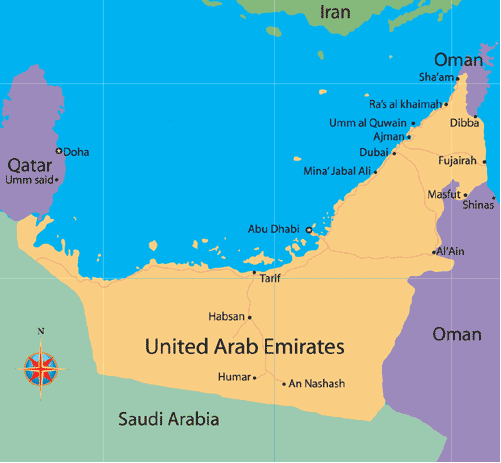
February 11, 2010 - People can expect to see these pictures, acquired exclusively by Khaleej Times, on cigarette packets and other tobacco products as soon as the Emirates Standardisation and Metrology Authority (ESMA) finalises the standardised packaging procedures being implemented GCC-wide.
On January 6, 2010 President His Highness Sheikh Khalifa bin Zayed Al Nahyan issued federal anti-tobacco law..The graphics that will replace the written word will be revised every one to two years. Nearly half of the cigarette pack will be covered by the pictures. Though the pictures are intended to deliver a strong message and de-motivate smokers, the graphics approved for the region are less dramatic.
“We have selected these carefully so that we do not hurt the sensibilities of the people in this region,” said Dr Wedad Al Maidoor, head of the UAE National Committee for Tobacco Control in the ministry. The UAE has taken permission to use pictures provided by Canada’s health authorities for two years since local pictures were not available.
A total of 23 countries in the world now include pictorial health warnings, with messages reaching more than 700 million people. In the eastern Mediterranean region, pictorial warnings are found in Egypt, Jordan, Iran and Djibouti.
Other than packaging, levels of nicotine, tar and carbon monoxide in each cigarette brand are being checked and cannot exceed the maximum set of international standards, said Engineer Mohamed Badri, Acting Director General of ESMA.
Reference: Picture this and Stop Smoking, Asma Ali Zain (asmaalizain@khaleejtimes.com), Khaleej Times, 2/10/2010.
UAE related news briefs:
UAE - national ban on smoking in public places delayed..;
UAE - with new law e-cigarettes may face ban..;
UAE - preventing the sale of tobacco products to youth..;
UAE to increase the price of cigarettes, graphic images on packs and more..;
UAE - conference presentation, risk of shisha use severe..;
UAE - enforcement of the new tobacco control law not clear yet..;
UAE - Khalifa issues federal anti-tobacco law..;
UAE - doctors say national smoking ban needed for the sake of young people..;
United Arab Emirates - Despite Ban, Shisha Habit Spreading in Public..;
Sharjah Emirate, UAE - earn monetary rewards for quiting smoking..;
Dubai, UAE customs blocks e-cigarette shipment..;
UAE - graphic warnings on cigarette packs..;
UAE new tobacco ban proposed..;
UAE - Quadruple Cigarette Price - Prevent Kids from Smoking...
Read more...
Tobacco companies frustrate Africa's fight against smoking..
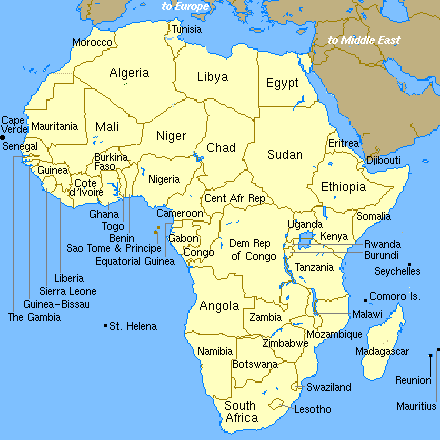
 February 11, 2010 KAMPALA, Uganda -- Tobacco companies are frustrating Africa's fight against smoking, which has left millions of people dead, a top health official said here on Tuesday, February 10th. Sam Zaramba, the director general of Health Services told a one-day international conference on tobacco that companies use corporate social responsibility programs as a strategy to prevent effective regulatory and legislative measures.
February 11, 2010 KAMPALA, Uganda -- Tobacco companies are frustrating Africa's fight against smoking, which has left millions of people dead, a top health official said here on Tuesday, February 10th. Sam Zaramba, the director general of Health Services told a one-day international conference on tobacco that companies use corporate social responsibility programs as a strategy to prevent effective regulatory and legislative measures.
The Bill & Melinda Gates Foundation has given a $7 million grant to the American Cancer Society aimed at curbing the tobacco industry's inroads in Africa. This grant follows a $10 million grant to the World Health Organization in December. (Gates Foundation ramps up tobacco control efforts in Africa, Posted by Kristi Heim, The Seattle Times, 2/3/2010)
"We know that in the struggle against tobacco, we face a powerful enemy, the tobacco industry. They are well established, they continue expanding and they have many resources," he said in a statement read for him by Sheila Ndyanabangi, the program manager for mental health and control of substance abuse. "We, therefore, need to be aware of the industry's activities and be able to counteract them effectively," he said.
He said tobacco use has remained the single largest preventable cause of death in the world, killing nearly 5 million people annually. According to the World Health Organization, 10 million people will die per year by 2030 from tobacco with 70 percent of these deaths occurring in developing countries.
Zaramba said 80 percent of the world's 1.3 billion smokers live in developing countries where tobacco consumption is on the rise.
He said for fear of losing profits tobacco companies have continued to oppose what have been proven to be effective public health measures aimed at stopping the tobacco epidemic.
Zaramba: "We need to stop the tobacco industry from continuing to make an indecent profit that ends up in the hands of the few, while the poorest people suffer the consequences. Let us be determined and act so that we can prevent all the preventable deaths caused by tobacco," he added.
The conference dubbed the African Tobacco Situation Analysis drew over 30 tobacco activists from various African countries including Togo, Benin, Mozambique, Ethiopia, Botswana and Uganda.
Reference: Tobacco companies frustrate Africa's fight against smoking: official, behavioralhealthcentral.com, 2/9/2010.
A few related news briefs:
Africa - the increase in tobacco use must be prevented..;
Africa - can a tobacco-related cancer epidemic be prevented..;
Africa - conference on the burden of cancer..;
Read more...
Poland - pubs and restaurants fear bankruptcy if smoking ban becomes law..

Click to enlarge..
Restaurateurs are appealing to parliamentarians to ease regulations in the new anti-smoking legislation. They claim that a complete ban on smoking in restaurants, pubs and clubs will cause many to go bankrupt.
Directly related news brief: Poland’s lower house of parliament (Sejm) is hotly debating a ban on smoking in all work environments and public places. Sejm will vote Friday, February 12th on smoking ban..
Poland is a country where tobacco smoking is one of the most important death factors. Every year about fifty thousand of Poles die of premature death from post smoking illnesses such as lung cancer or heart attacks.
Joanna Mucha, a Civic Platform (PO) member of the Health Commission has said the bill proposing a complete ban on smoking in public places is very unlikely to be accepted in its current form. The reason is that the proposed laws hurt the interests of restaurateurs, as well as the owners of pubs and clubs. (PO to water down anti-smoking bill, Source: Polska - The Times, The Warsaw Business Journal, 2/11/2010.)
The restaurant owners have now presented the findings of a study of 600 restaurants by TNS OBOP, where 54 percent of respondents believed the number of customers will drop because of a smoking ban. Only 3 percent thought the number would increase.
According to Artur Jasiński, president of the Cafe Club chain, one of his cafes that was forced to impose a smoking ban by the mall where it was located, saw the number of customers fall by 28 percent within three years, and became uneconomical.
Reference: Pubs and restaurants fear bankruptcy over smoking ban, Source: Dziennik Gazeta Prawna, The Warsaw Business Journal, 2/10/2010.
Related news briefs:
Poland - lower house of parliament (Sejm) will vote Friday, February 12th on smoking ban..;
Poland - son suing Philip Morris Polska and Zakłady Przemysłu Tytoniowego over death of his mother..;
Poland to ban smoking in indoor public places, in passenger cars if children present and prohibit display of cigarettes..;
Read more...
Egypt - anti-smoking campaign faces challenges..
Egypt - Coat-of-Arms..

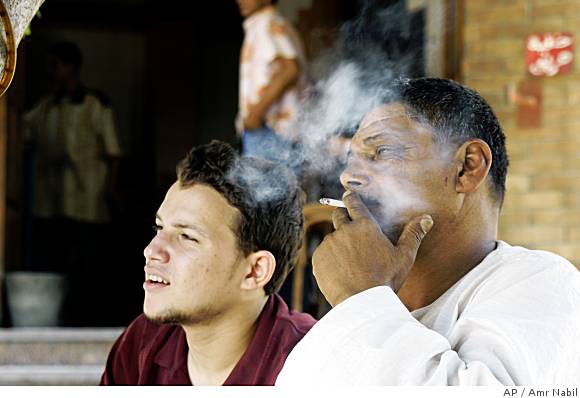 February 11, 2010 - The results of a recent survey published by Egypt's Central Agency for Public Mobilization and Statistics (CAPMAS) on Jan. 28 showed that 20 percent of the 77.5 million Egyptians are smokers. 16 percent of the population smoke cigarettes and 2.3 percent smoke hookah, while 2.6 percent use chewing tobacco. (Eygypt - cracking down on shisha use..) Around 439,000 children in Egypt under the age of 15 smoke cigarettes, some 74,000 of them are under 10. According to the Egyptian Health Ministry, smoking kills 37,000 people in the country each year.
February 11, 2010 - The results of a recent survey published by Egypt's Central Agency for Public Mobilization and Statistics (CAPMAS) on Jan. 28 showed that 20 percent of the 77.5 million Egyptians are smokers. 16 percent of the population smoke cigarettes and 2.3 percent smoke hookah, while 2.6 percent use chewing tobacco. (Eygypt - cracking down on shisha use..) Around 439,000 children in Egypt under the age of 15 smoke cigarettes, some 74,000 of them are under 10. According to the Egyptian Health Ministry, smoking kills 37,000 people in the country each year.
In June 2007 Egypt's People's Assembly has passed anti-smoking legislation banning the sale of tobacco to minors under 18 and from smoking in indoor areas. The law, which went into effect immediately, also included a ten percent increase in the cost of cigarettes. (Egypt Passes National Anti-Smoking Law..)
However, Ban smoking laws are worthless if not enforced..
Smoking in Egypt spreads more among adult males with nearly one third of this category cigarettes or hookah smokers. Around 439,000 children in Egypt under the age of 15 smoke cigarettes, some 74,000 of them are under 10. According to the Egyptian Health Ministry, smoking kills 37,000 people in the country each year. Ninety percent of Egyptians believe that smoking is a major cause of some life-threatening diseases like asthma, lung cancer and birth defects, according to the survey results.
The recent survey showed that 41 percent of Egyptian smokers tried to give up, but only 18 percent of them succeeded. This means that only less than eight percent of the total number of smokers give up.
The Egyptian government has been exerting strenuous efforts in cooperation with local NGOs (non-government agencies) to curb smoking, a disconcerting habit spreading widely in the most populous Arab nation, especially smoking hookah or "Shisha" as known by Egyptians. The most conspicuous measure taken by the government is compelling tobacco manufacturers and importers to print warnings on their products including photos that show the dangers of smoking to lives. (Egypt, CAPMAS Study Graphic Photos on Cigarette Packs - NOT EFFECTIVE..)
However, the governmental campaign was countered by smart solutions from defiant smokers, apparently in challenge of the measures. At the early beginning of the campaign, some smokers used to hide the warning photos with a small piece of blank paper or even with substitute beautiful drawings. The idea developed later as some manufacturers made use of the measure and invented separately-sold covers with beautiful photos on them to hide the warning picture. Later on, new cigarette boxes supplied with lighters spread in the markets. Some women also used their makeup boxes to hide their cigarettes after getting rid of the original packet.
Reference: Feature: Egypt's anti-smoking campaign faces challenges, istockanalyst.com, 2/10/2010.
Some related news briefs:
Africa - can a tobacco-related cancer epidemic be prevented..;
Egypt, CAPMAS Study Graphic Photos on Cigarette Packs - NOT EFFECTIVE..;
Egypt - warning pictures on cigarette packs - INEFFECTIVE..;
Egypt's fledgling anti-tobacco program to place images and warnings on cigarette packs..;
Egypt Passes National Anti-Smoking Law..;
Read more...
Poland - lower house of parliament (Sejm) will vote Friday, February 12th on smoking ban..
Sejm of the Republic of Poland


February 11, 2010 - Poland’s lower house of parliament (Sejm) is hotly debating a ban on smoking in all work environments and public places.
The restrictive regulations have been forced through by the parliamentary health commission, aimed at cutting disease from second-hand smoke. Smokers and opponents of the law are accusing MPs of trying to create a ‘nanny state.’
Tobacco smoking has become one of the most important death factors in Poland. Every year about fifty thousand of Poles die of premature death from post smoking illnesses such as lung cancer or heart attack. 47% of Polish men and 23 % of Polish women over sixteen are addicted to nicotine.
The plan to make smoking illegal in restaurants, pubs and disco clubs prompted especially energetic protests from owners and patrons. A survey among 600 restaurant owners, conducted by OBOP pollsters, shows that over a half of them are worried by expected decline in business. But, slightly over 40 percent do not expect any changes, while 3 percent think that smoke free restaurants and pubs will attract more customers. Owners want to be able to decide themselves whether their venue will or will not be smoke free.
Poles seem to share the view of concerned restaurant owners. Though 70 percent of them support a total smoking ban in public places (excluding restaurants and pubs), 90 percent want separate places for smokers to exist.
The house will vote decidedly on the smoking ban on Friday. (kk/mmj)
Background: Democracy and Health: Tobacco Control in Poland, Witold Zaton’ski, 4/14/03.
Reference: Poland to ban cigarette smoking in public?, the news.pl, 2/10/2010; Polish Government To Limit Smoking In Poland, Victoria Ziarkowski, - Editor, Freelance Writer, Translator, Travel Writer, The Outlook, 1/10/2010.
Related news briefs:
Poland - son suing Philip Morris Polska and Zakłady Przemysłu Tytoniowego over death of his mother..;
Poland to ban smoking in indoor public places, in passenger cars if children present and prohibit display of cigarettes..;
Read more...
Kentucky - proposal to tax moist snuff based on price rather than weight fails..
 February 11, 2010 - Kentucky tobacco farmers have been fighting a proposed change in Kentucky's taxing system that would levy higher taxes on smokeless tobacco based on price instead of weight; one of many moves the General Assembly is considering to help balance the Commonwealth's estimated $1.5 billion budget shortfall.
February 11, 2010 - Kentucky tobacco farmers have been fighting a proposed change in Kentucky's taxing system that would levy higher taxes on smokeless tobacco based on price instead of weight; one of many moves the General Assembly is considering to help balance the Commonwealth's estimated $1.5 billion budget shortfall.
They got their wish Tuesday afternoon, February 9th as the proposal included in House Bill 296 was rejected by the House Appropriations and Revenue Committee by a 14-12 vote where 15 votes were needed to get to the House floor for a vote.. Under the bill, the tax on premium, moist snuff would have been based on price rather than weight. That change would have increased the tax from 19 cents to about 29 cents a tin.
The bill would have dropped the current wholesale excise tax rate for tobacco products other than cigarettes from the current 15 percent to 12.1 percent.
Makers of higher-priced snuff said shifting the tax to wholesale prices would have raised the levy on their products. However, lower-priced snuff makers said it would amount to a tax cut for their product and would put all makers on equal footing.
The bill pitted three Kentucky moist snuff manufacturing plants against U.S. Smokeless Tobacco, which operates a processing facility in Hopkinsville. U.S. Smokeless Tobacco is owned by Altria, the parent of Philip Morris USA. U.S. Smokeless plant manager Danny Kingins said the change would result in the tax on a can of Skoal or Copenhagen increasing from 19 to 29 cents per can, while Longhorn, made by Swedish Match would drop from 19 cents to 13 cents per can. A statement from Swedish Match said the company was disappointed that the committee didn’t pursue the bill.
References: Snuff tax changes rejected by Gregory A. Hall (ghall@courier-journal.com), Louisville Courier-Journal, 2/9/2010; Tobacco tax proposal voted down by House committee by TOM BERRY, Staff Writer, Murray Ledger & Times, 3/11/2010.
A few related news briefs:
Kentucky - more cities going smoke free..;
Kentucky - rate of adult smoking drops..no longer the highest..;
Kentucky - state cigarette tax increase as of April 1 , 2009..;
Kentucky raises taxes on cigarettes..;
Kentucky considering increase in cigarette tax..;
Kentucky to go ‘fire safe’ by next year..;
Read more...
Electronic cigarettes - study finds not an effective nicotine delivery system..
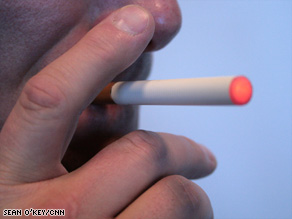 February 10, 2010 - "Electronic cigarettes" that vaporize nicotine juice to inhale instead of smoke from burning tobacco do not deliver as promised, according to research at Virginia Commonwealth University. "They are as effective at nicotine delivery as puffing on an unlit cigarette," said Dr. Thomas Eissenberg, at the school's Institute for Drug and Alcohol Studies.
February 10, 2010 - "Electronic cigarettes" that vaporize nicotine juice to inhale instead of smoke from burning tobacco do not deliver as promised, according to research at Virginia Commonwealth University. "They are as effective at nicotine delivery as puffing on an unlit cigarette," said Dr. Thomas Eissenberg, at the school's Institute for Drug and Alcohol Studies.
In a previous study, back in July 2009 Eissenberg and colleagues reported that the tobacco and drug industries' hottest contenders for a reduced harm product -- snus, a traditional Swedish oral tobacco, as well as powdered tobacco tablets and nicotine lozenges -- don't ease smokers' cravings for nicotine as well as cigarettes do. (Smokeless tobacco products may not curb smokers’ cravings..)
The latest clinical evidence suggests users of e-cigarettes are not getting the addictive substance they get from smoking tobacco. "These e-cigs do not deliver nicotine," Eissenberg said of the findings he expects to publish in an upcoming issue Tobacco Control, a product of the British Medical Journal Group.
This past summer, Eissenberg recruited smokers without prior experience using e-cigarettes to volunteer to use two popular brands of the devices for a set period. The 16 subjects were regularly measured in a clinical setting for the presence of nicotine in their bodies, their reported craving for conventional cigarettes, and certain physiological effects such as a change in heart rate.
"Ten puffs from either of these electronic cigarettes with a 16 mg nicotine cartridge delivered little to no nicotine," the study found.
But the units may deliver hazardous chemicals, according to preliminary checks by federal regulators. In a notice to importers, the FDA blocked continued shipments after finding diethylene glycol, a chemical used in antifreeze that is toxic to humans. (FDA: Electronic cigarettes contain toxic chemicals..
The government's statement noted there are no health warnings on the products, and that "the FDA analyses detected carcinogens, including nitrosamines."
The notice of the import ban says "the product appears to be a combination drug-device," that "requires pre-approval, registration and listing with the FDA" in order to be marketed in the United States.
A company challenging the import ban claims in federal court documents to have sold 600,000 of the devices in a year's time through a network of 120 distributors in the United States.
"We are on the verge of going out of business, which is why we are suing the FDA in U.S. District Court," said Washington, attorney Kip Schwartz, representing a company called "Smoking Everywhere," a U.S. wholesaler that was importing the devices from China.
The lawsuit questions the FDA's authority to block shipments of a non-tobacco product, and says the agency has violated its statutory process for product review. Liquid nicotine is available on the open market through pharmaceutical houses and vendors who sell e-cigarettes.
A judge January 14 ruled the FDA does not have such authority, but the agency has taken the matter to the U.S. Court of Appeals, which has yet to decide the case. The appeals panel issued a stay against the judge's ruling until it can rule on the agency's appeal. Meanwhile, based on the judge's ruling, lawyers for the importers have filed a request to compel the FDA to lift its import ban, saying the agency is not likely to win its appeal. The filing says "although e-cigarettes have been sold since 2007, FDA has not identified a single instance, either in this Court or below, of an adverse health effect from e-cigarettes."
A federal appeals court has put on hold a lower court ruling (paragraph above) allowing electronic cigarettes to be imported. The U.S. Court of Appeals for the District of Columbia Circuit stayed a lower court order banning the U.S. Food and Drug Administration (FDA) from seizing the devices when they enter the country. (U.S. - federal appeals court, import of e-cigarettes on hold again..)
Reference: Study: 'Electronic cigarettes' don't deliver by Paul Courson, CNN, 2/9/2010.
(e-cigarettes, e-cigs)
Read more...
Quebec - survey finds more teenagers are smoking..

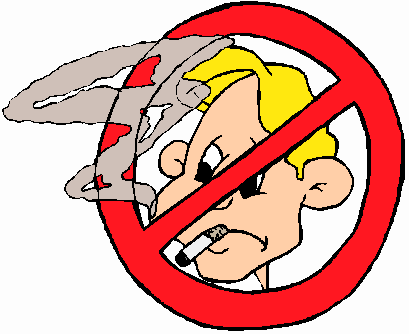 February 10, 2010 - More teenagers in Quebec are turning to smoking – a troubling new development that raises questions about whether the provincial government has gone far enough to curb tobacco use among youth, experts say.
February 10, 2010 - More teenagers in Quebec are turning to smoking – a troubling new development that raises questions about whether the provincial government has gone far enough to curb tobacco use among youth, experts say.
The latest survey on smoking by Statistics Canada shows that in Quebec, one in five teens age 15 to 19 lit up last year – an increase of three per cent from 2008.
The Canadian Tobacco Use Monitoring Survey is carried out semi-annually and is based on a survey of more than 9,000 respondents. The latest survey, made public Monday, February 8th was for February to June 2009.
By comparison, the national smoking rate for that age group declined from 15 per cent to 14 per cent.
What’s more, 11 per cent of Quebec children up to the age of 11 said they were exposed to second-hand smoke at home, compared with five per cent for the whole country.
“Something is attracting teenagers to smoking,” said Marc Drolet, a spokesperson for the Quebec division of the Canadian Cancer Society. “There was a downward trend for the past 10 years, and now for some reason, the trend has probably reversed. Unfortunately, we are now the Canadian champions in that (smoking age) category.” Drolet conceded that the government has taken some strong anti-smoking measures to date, like banning it in bars and restaurants. But he urged Quebec to do more to curb subtle marketing campaigns by tobacco companies aimed at youth.
Karine Rivard, press attaché to Health Minister Yves Bolduc, defended the government’s anti-smoking initiatives and said that more were planned for this year. She noted that the government has banned the sale of single cigarillos with grape and other flavours that had been popular with some teens. “The government intends to continue to intensify the fight against tobacco,” Rivard said, although she declined to describe some of the proposed anti-smoking measures.
The survey did contain some good news, however. The prevalence of tobacco use in an older age group of Quebecers – 20 to 24 – dropped to 25 per cent last year from 31 per cent for the corresponding period in 2008.
Smoking is considered the main cause of avoidable cancer in the world, killing more than 5 million people each year. Tobacco use has been linked to 85 per cent of cases of lung cancer and is responsible for 30 per cent of all cancers, according to the Canadian Cancer Society. In Quebec, 7,400 Quebecers received a diagnosis of lung cancer last year and 6,500 died from that illness.
Reference: More Quebec teens are taking up smoking by Aaron Derfel, Montreal Gazette Health Reporter, 2/8/2010.
Some Quebec related news briefs:
Canada, Ontario and Quebec - illegal cigarettes greater than 40% of consumption..;
NCACT welcomes Quebec government's tabling of bill to fight contraband tobacco..;
Canada Ontario/Quebec - make it illegal for minors to possess tobacco products..;
Quebec - intends to sue cigarette makers to recoup health costs..;
Congratulations to the Canadian Provinces of Quebec and Ontario for Eliminating the Display of Tobacco Signs and Tobacco Products in Retail Outlets..;
Quebec - Teens Switch from Cigarettes to Cigarillos;
WANT More do a random search..
Read more...
More - Lorillard will launch new moist smokeless product in not-too-distant future..
February 10, 2010 - As we reported on Monday, February 8th Lorillard and Swedish Match had mutually agreed to terminate their joint venture to produce and market Triumph Snus at the end of 2009. At the 2009 earnings call CEO Martin Orlowsky announced that Lorillard would enter the United States moist smokeless tobacco (MST) market in the not-too-distant future. (Lorillard - Triumph SNUS is dead, more conventional moist snuff product coming..)
Sales of smokeless tobacco products, widely sold by companies such as Altria Group Inc. through brands like Copenhagen and Skoal, have risen in the United States even as cigarette sales have dropped.
Snus differs from most smokeless tobacco products because it is created through a special pasteurization process. It comes in small pouches and does not require spitting. On a conference call, Lorillard said the snus product did not make gains in the test markets in the United States and that it may not have been the right time for the product in North America. Lorillard appears to be betting that Americans will continue to lean toward traditional formulations like moist smokeless tobacco, as opposed to newer forms they are less familiar with.
Other companies are still saying they believe snus has a future in the United States. Altria and Reynolds American Inc. have launched snus products, but sales of these products have generally stayed relatively small, according to the Journal. Both of these companies, however, said they are expanding the reach of their snus products.
A spokesperson for Reynolds American, David Howard, told the paper that the company has been very pleased with sales of its Camel Snus product and believes that it is a "viable" product. The company rolled out Camel Snus nationwide in first-quarter 2009 after putting it in test markets for almost three years. "It's a small market, but we believe there is potential growth for that market," Howard said. An Altria spokesperson, Brendan McCormick, told the paper that the company is pleased with the results of its Marlboro Snus product in test markets and will be expanding it nationally at the end of March.
Dr. Gregory N. Connolly, a Harvard public health professor: “It is worth noting that for every pack of snus sold in the U.S., about 3,000 packs of lights [cigarettes] are sold..”
Swedish Match sells its flagship snus brand General in the United States, as well as another brand called Catch. These were sold outside of the Lorillard joint venture and will continue to be sold in the United States. Swedish Match will also continue selling the moist smokeless tobacco products, such as its Red Man and Timberwolf brands, it already sells in the United States.
Lars Dahlgren, CEO of Swedish Match: "We remain committed to the U.S. market." The company said the dissolution of the Lorillard joint venture has no bearing on its snus joint venture company with Philip Morris International Inc. That venture aims to distribute snus products outside of the United States and Scandinavia.
Lorillard dominates the market for menthol cigarettes. Lorillard's Newport brand represents the bulk of its U.S. sales, and its U.S. volume fell 6.5% during the quarter, though its U.S. market share rose to 10.32% from 9.86%
Greensboro, N.C.-based Lorillard is the third-largest manufacturer of cigarettes in the United States. In addition to Newport, the Lorillard product line has five additional brand families marketed under the Kent, True, Maverick, Old Gold and Max brand names. These six brands include 41 different product offerings which vary in price, taste, flavor, length and packaging.
Reference: Lorillard to Enter Moist Market
Ends Swedish Match snus venture; will launch new moist smokeless product, CSP (Convenience Stores/Petroleum) Daily News, 2/10/2010.
Read more...
North Carolina - may restore tax stamp to reduce smuggling..

 February 9, 2010 - For years, buying low-tax North Carolina cigarettes and selling them on the black market in a high-tax state up north has been an easy way to make big money for criminal enterprises. Load up a van of Camels or Marlboros and reap a $100,000 profit to sell them if the destination is New York City, which has a $1.50-per-pack excise tax in addition to the $2.75 state cigarette tax. (New York City - cigarettes more than $10- a- pack..)
February 9, 2010 - For years, buying low-tax North Carolina cigarettes and selling them on the black market in a high-tax state up north has been an easy way to make big money for criminal enterprises. Load up a van of Camels or Marlboros and reap a $100,000 profit to sell them if the destination is New York City, which has a $1.50-per-pack excise tax in addition to the $2.75 state cigarette tax. (New York City - cigarettes more than $10- a- pack..)
"The cigarette tax evasion stampede is out of control," said Jim Calvin, president of the New York Association of Convenience Stores. More than half of cigarettes purchased in his state are bought without paying state or local taxes, largely because of out-of-state smuggling and Internet sales.
Catching people with North Carolina contraband is difficult because it's one of three states that don't require tax stamps affixed on every pack being sold. Interest in restoring the stamps after a 16-year hiatus has been revived as a way to deter smuggling from North Carolina - and in an ironic change - into North Carolina. The state now may be the target for cheaper cigarettes from South Carolina, which has a 7-cent-per pack tax and doesn't use stamps. North Carolina's 45-cent tax has grown nine fold since 2005, creating a cross-border difference of $3.80 per carton.
"We've only been at a tax disadvantage since the tax went up in the past couple of years," said Gary Harris with the North Carolina Petroleum and Convenience Marketers Association.
Stamps provide evidence the wholesaler has paid the state tax before packs are shipped to retailers. Black-market vendors have a harder time selling stamped packs because they can't easily hide their origin or must try to replace the stamp with a counterfeit from another state. North Dakota is the only other state without stamps.
In 2002, a federal jury in Charlotte convicted two Lebanese citizens of diverting millions of dollars in cigarette smuggling proceeds to the radical Islamic group Hezbollah by shipping North Carolina cigarettes to Michigan for resale. Another grand jury indicted nine people in November for a smuggling operation that prosecutors alleged reaped at least a $5 million profit.
"Criminal organizations all over the country exploit variants in state excise taxes and tax stamping laws to generate millions and millions of dollars in illicit profits," said Sandy Sands, a lobbyist representing Philip Morris USA, which wants the stamps restored. "We're not talking about the people that come down and vacation at the beach and take eight or 10 cartons home with them to Ohio and Pennsylvania."
Lawmakers studying the issue over the past month in a revenue law committee sound interested in restoring the stamps first used in North Carolina in 1969, when lawmakers approved its first 2-cent tax on cigarettes.
The General Assembly eliminated the stamps in 1994 because the 3 cents per carton tax wholesalers got to keep for administrative expenses was hardly enough to defray the costs of sticking them, said Sands, a state senator at the time of the repeal. Today, wholesalers receive a 2 percent discount - about 9 cents per carton - to help with filing monthly revenue reports to the state. But they're concerned that won't be enough if they're required to stamp again.
Stamping machines can cost $80,000 each, said Sonny Wooten, president of Southco Distributing Co. in Goldsboro, and additional employees may have to be hired. Large retailers who act as their own wholesalers don't want their costs raised during a recession.
Wooten said a 4 percent discount may be enough. Otherwise, the extra cost is eventually passed on to consumers, said Andy Ellen with the North Carolina Retail Merchants Association.
Doubling the discount could take away several million dollars away from the state's coffers, months after the General Assembly raised the cigarette tax by 10 cents a pack.
Add word from legislative researchers that the state actually would lose another $5.4 million in annual tax revenues with stamps at the current 2 percent discount - and spend $1.2 million every year to run the program - and some lawmakers are sure to have second thoughts during tight budget times.
The analysis found the stamp requirement would discourage cigarette smuggling out of North Carolina, estimated at 18 million packs this year.
While lawmakers want more information about the bill before the session reconvenes in May, many suggested curbing smuggling was the priority. "I'm beginning to look more favorably at the bill," said Rep. Bill McGee, R-Forsyth, a former R.J. Reynolds Tobacco Co. employee. "It doesn't raise taxes, it only helps us to collect the taxes that were due us and it would prevent some of this other untoward activity."
Reference: N.C. examining cig stamps again to deter smuggling by GARY D. ROBERTSON - Associated Press Writer, The News & Observer, 3/7/2010.
(illegal, illicit, black market)
Related North Carolina smoking ban news briefs:
North Carolina - smoking ban forces smokers outside in the cold..;
North Carolina - some hookah bars owners stay open after smoking ban begins..;
North Carolina (NC) - beginning in January 2010 fire safe cigarettes (FSC), smoking ban in public places..;
North Carolina - smoking ban simple details, January 2, 2010..;
North Carolina - smoking ban does not allow hookah bars to operate - RIGHT..;
North Carolina smoking ban includes banning hookah bars..;
North Carolina Governor Purdue signs smoking ban law..;
North Carolina - legislators approve smoking ban..;
North Carolina - smoking ban scaled back again..;
North Carolina Senate Health Committee votes for stricter smoking ban..;
North Carolina House poised to pass smoking ban..;
North Carolina - ban on smoking in public places passes 1st test...
Read more...
Australia Victoria Frankston - smoking outdoors will be outlawed on certain streets..
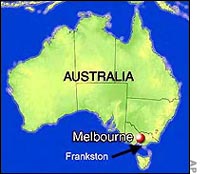 February 10, 2010 - Frankston City Council (located in the State of Victoria) is preparing to impose blanket bans along three busy open-air shopping strips, including opposite the train station. Lighting up in the designated exclusion zones during the planned six-month trial could cost defiant smokers fines up to $110.
February 10, 2010 - Frankston City Council (located in the State of Victoria) is preparing to impose blanket bans along three busy open-air shopping strips, including opposite the train station. Lighting up in the designated exclusion zones during the planned six-month trial could cost defiant smokers fines up to $110.
Frankston Mayor Christine Richards said yesterday the bid to banish cigarette smoke from streets would probably upset some people, but the health benefits were worth any flak. "We want to make people think twice about the way they conduct themselves in the public domain, and who they are affecting," she said.
"We want to make people think twice about the way they conduct themselves in the public domain, and who they are affecting," she said. "There are a huge number of deaths from tobacco in Victoria each year, more than from alcohol and traffic accidents and illicit drugs. "We want to do something about it." Almost 15,000 Australians die from tobacco-related diseases each year. (Australian population 21,374,000 - 2008 Source: World Bank, World Development Indicators)
Cr Richards said the hefty fines would be imposed by council officers, but details were still to be decided. Richards said the proposed laws were a glimpse of the future for Victorian smokers, and she hoped other councils would adopt similar measures.
But Alistair Wardle - the only one of nine councillors to vote against the trial - described the move as "a bit extreme". "My main concern is that it is an infringement of civil liberties," Cr Wardle said. "It's getting trivial, booking people for smoking on the pavement. It's open space. "If people see someone smoking, they can walk around them."
A report by council staff said the bans would be complicated and noted community concerns about over-regulation. "Smoking is a legal activity and people who smoke are not criminals, nor are they undesirable individuals to have in commercial precincts," it said.
Victorian laws already ban smoking in pubs, cafes, shopping centres, gaming venues and workplaces, on some beaches, on covered train platforms, and in cars carrying children.
Sydney councils may consider banning outdoor smoking if a similar prohibition in Victoria is deemed a success. Smoking anywhere in public could one day be a thing of the past for Australians.
Reference: Vics first to crack down on street smokers by Fiona Hudson, HeraldSun.com.au, 2/9/2010.
Read more...
UAE - national ban on smoking in public places delayed..

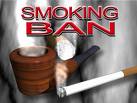
February 9, 2010 - ABU DHABI - A national ban on smoking in public places will be delayed while it is decided which government bodies will be responsible for enforcing various parts of the legislation, health officials said yesterday.
On January 6, 2010 President His Highness Sheikh Khalifa bin Zayed Al Nahyan issued UAE the federal anti-tobacco law...
Key players involved in drafting the anti-smoking regulations told The National that the public will be fully informed once the details have been worked out, which could take weeks or months. Discussions between bodies such as the Ministry of Health, police and individual municipalities will lead to decisions on how and when parts of the law come into force.
The Ministry of Health revealed some details of the new law last month but said the full system of rules would be outlined in an appendix to be released later this year.
Dr Mahmoud Fikri, the ministry’s director of health legislation and policies, asked people to wait for clarification from the Government. “There are many details to be finished,” he said. “Technical committees will be set up to establish exactly how the law will be implemented.”
Dr Wedad al Maidoor, the head of the National Tobacco Control Committee said: “We understand that some people might be confused, as it a very comprehensive law. We are going to plan awareness campaigns when we have done the appendix. We will know then what the public need to know.”
Reference: Date for smoking ban is delayed, Mitya Underwood, The National, 2/8/2010.
UAE related news briefs:
UAE - with new law e-cigarettes may face ban..;
UAE - preventing the sale of tobacco products to youth..;
UAE to increase the price of cigarettes, graphic images on packs and more..;
UAE - conference presentation, risk of shisha use severe..;
UAE - enforcement of the new tobacco control law not clear yet..;
UAE - Khalifa issues federal anti-tobacco law..;
UAE - doctors say national smoking ban needed for the sake of young people..;
United Arab Emirates - Despite Ban, Shisha Habit Spreading in Public..;
Sharjah Emirate, UAE - earn monetary rewards for quiting smoking..;
Dubai, UAE customs blocks e-cigarette shipment..;
UAE - graphic warnings on cigarette packs..;
UAE new tobacco ban proposed..;
UAE - Quadruple Cigarette Price - Prevent Kids from Smoking...
Read more...
New Study - children are especially vulnerable to thirdhand smoke..

February 9, 2010 - Scientists say nicotine stains (lingering residue) on clothing, furniture and wallpaper can react with a common indoor pollutant to generate dangerous chemicals called tobacco-specific nitrosamines or TSNAs. In the tests, contaminated surface exposed to "high but reasonable" amounts of the pollutant nitrous acid - emitted by unvented gas appliances and in car exhaust - boosted levels of newly formed TSNAs 10-fold. Substantial traces of TSNAs were also found on the inside surfaces of a truck belonging to a heavy smoker.
The researchers say third-hand smoke is an unappreciated health hazard and suggest a complete ban on smoking in homes and in vehicles to eliminate any risk. These findings raise concerns about exposures to the tobacco smoke residue that has been recently dubbed “thirdhand smoke.” This warning would have to include electronic (e) cigarettes where amounts of nicotine are inhaled and also exhaled.
Children are especially vulnerable to thirdhand smoke..
PAPER: Formation of carcinogens indoors by surface-mediated reactions of nicotine with nitrous acid, leading to potential thirdhand smoke hazards, Mohamad Sleiman,
Lara A. Gundel, James F. Pankow, Peyton Jacob III, Brett C. Singer, and Hugo Destaillats, Proc. National Academy of Sciences - published online before print February 8, 2010, ABSTRACT.., FULL TEXT....
Toxic particles from cigarette smoke can linger on surfaces long after the cigarette has been put out, and small children are particularly susceptible because they are likely to breathe in close proximity, or even lick and suck them, they say. Researcher Lara Gundel, of the Lawrence Berkeley National Laboratory, said: "Smoking outside is better than smoking indoors but nicotine residues will stick to a smoker's skin and clothing.
"Those residues follow a smoker back inside and get spread everywhere. The biggest risk is to young children. "Dermal uptake of the nicotine through a child's skin is likely to occur when the smoker returns and if nitrous acid is in the air, which it usually is, then TSNAs will be formed." They are now doing more research to better understand what threat, if any, TSNAs pose.
The most important step parents can take to protect their families from the dangers of cigarette smoke is to make their homes and cars smokefree.. Ed Young of Cancer Research UK.
Amanda Sandford of Action on Smoking and Health said: "The harmful effects of second-hand smoke are already well-established but this study adds a new dimension to the dangers associated with smoking and provides further evidence of the need to protect children, in particular, from exposure to tobacco smoke. "The study shows that the residue of smoke on surfaces represents a potential risk for cancer but so far we don't know how big at risk."
Parental tobacco use is a serious health issue for all the family members. To learn more - Click.
Reference: Third-hand smoke' could damage health, BBC News, 2/9/2010.
Read more...
Pakistan - govt misses deadline to implement pictorial tobacco warnings..
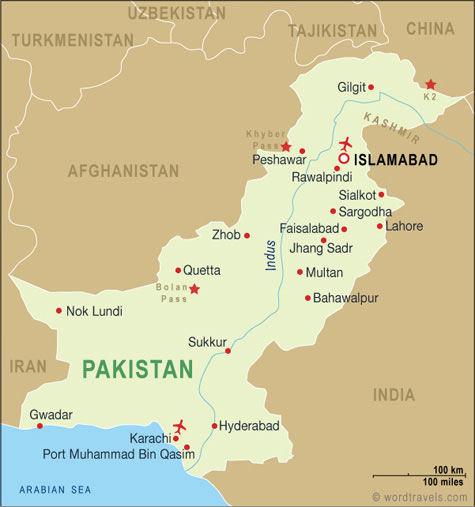
 February 9, 2010 - ISLAMABAD: The country’s healthcare authorities have once again failed to implement the decision regarding enforcing pictorial warnings on cigarette packs from February 1, 2010. Initially, January 1, 2010 had been set as the deadline to implement the decision, which was later extended to February 1, 2010.
February 9, 2010 - ISLAMABAD: The country’s healthcare authorities have once again failed to implement the decision regarding enforcing pictorial warnings on cigarette packs from February 1, 2010. Initially, January 1, 2010 had been set as the deadline to implement the decision, which was later extended to February 1, 2010.
The decision to print a pictorial health warning was announced by the Health Ministry on May 31, 2009.
The Network, a leading anti-smoking civil society organisation, criticised the government’s failure to enforce the ministry’s decision, which has again extended the implementation until the end of May, 2010. It said the government had been constantly violating its own decisions to implement the pictorial warnings, suspecting the government was secretly safeguarding the interests of the tobacco industry. The Network Executive Director Dr Arif Azad said almost 273 people die of tobacco-related diseases in Pakistan every day.
Azad- Pakistan, along with another 168 countries, was bound by the Framework Convention on Tobacco Control (FCTC) to enforce pictorial health warnings on cigarette packs. The treaty was drafted under the aegis of World Health Organisation and adopted by world health assembly in 2003, with Pakistan ratifying it on Novembers 3, 2004.
Reference: Govt misses deadline to implement pictorial tobacco warnings, Staff Report, Pakistan Daily Times, 2/2/2010.
Pakistan - related news brief:
Pakistan - over 273 people die daily of smoking related disease..;
Pakistan - implementation of tobacco control laws difficult..;
Pakistan - February, 2010 - graphic warnings on cigarette packs..;
Pakistan National Conference Tobacco Control, October 28th..;
Pakistan - pictorial health warnings on cigarette packs and cartons soon..;
Pakistan - More, on rollback of the Statutory Regulatory Order on Designated Smoking Areas..;
Smuggled Cigarettes Give Boost To Pakistani Militants..;
Pakistan - strong tobacco control measures..;
Pakistan - Government must withdraw Statutory Regulatory Order..;
Bloomberg Grant: Tobacco Reforms in Pakistan...

Click to enlarge..
Read more...
Germany - Bavaria referendum on smoking in cafés and beer halls on July 4, 2010..
Click to enlarge..
 February 9, 2010 - The Bavarian government says it will hold a referendum on smoking in cafés and beer halls. More than 9 million voters in the southern German state will be allowed to cast their ballots on 4 July.
February 9, 2010 - The Bavarian government says it will hold a referendum on smoking in cafés and beer halls. More than 9 million voters in the southern German state will be allowed to cast their ballots on 4 July.
January 1, 2008 eight German states including Bavaria marked the New Year by introducing smoking bans in public places including restaurants and bars. In July 2009 smokers in Bavaria rejoiced as the state’s parliament loosened the regulations on a smoking ban instituted 18 months before. Then on Thursday, October 1, 2009 Germany’s high court in Karlsruhe ruled that Bavaria’s looser implementation of its smoking ban is constitutional.The issue has been under discussion for some time. For many years, smoking regulations were far stricter in Bavaria than in the rest of Germany but the authorities decided to permit smoking in small cafés last August.
The smoking referendum will have no effect on the nationwide ban on smoking in restaurants. The Bavarian government also said that smoking will allowed during this year's Oktoberfest, which is held annually at the end of September.
Reference: Smoking referendum in Bavaria, Netherlands Radio Worldwide, 2/4/2010.
Related news brief:
Germany - losing billions as smokers find cheaper places to buy cigarettes..;
Germany - smokers smoking less but it's costing more..;
Bavarians force referendum on smoking ban next year..;
Bavaria - court rules, looser implementation of smoking ban constitutional..;
Germany - beer sales are down smoking ban maybe partial blame..;
Bavaria - state's parliament loosened regulation on smoking ban..;
WHO Report on the Global Tobacco Epidemic 2008..;
German sales rise in Germany amid moves to impose smoking ban..

Click to enlarge..
Read more...


To Provide Public Awareness
Purpose
About Us
Contact Us
2008 HIGHLIGHTS
TOPIX PAPERS - 2008 & 2009..
Archive
-
▼
2010 (1530)
-
▼
02/07 - 02/14 (32)
- Australia - second hand smoke serious impact on d...
- Czech Republic - Philip Morris decides not to pass...
- South Carolina - candidates disagreed on whether ...
- WHO's Global Adult Tobacco Survey - RESULTS..
- In process: PMI - q4 2009 and full year..
- Campaign for Tobacco-Free Kids increasing cigarett...
- SIMILAR Smokeless Cigarettes - no battery require...
- UK - Vending Machines..Imperial Tobacco seeks Judi...
- Florida - $300 million jury award to former smoker...
- UAE - cigarette pack graphic warnings
- Tobacco companies frustrate Africa's fight against...
- Poland - pubs and restaurants fear bankruptcy if ...
- Egypt - anti-smoking campaign faces challenges..
- Poland - lower house of parliament (Sejm) will v...
- Kentucky - proposal to tax moist snuff based on pr...
- Electronic cigarettes - study finds not an effect...
- Quebec - survey finds more teenagers are smoking..
- More - Lorillard will launch new moist smokeless p...
- North Carolina - may restore tax stamp to reduce s...
- Australia Victoria Frankston - smoking outdoors wi...
- UAE - national ban on smoking in public places del...
- New Study - children are especially vulnerable to ...
- Pakistan - govt misses deadline to implement pict...
- Germany - Bavaria referendum on smoking in cafés ...
- Lorillard - Triumph SNUS is dead, more conventiona...
- Greece - latest attempt at a smoking ban failing..
- Romania - PMI suspends cigarette production for tw...
- EU loses EUR 10 billion annually from cigarette sm...
- RAI - highlights q4 2009 and full year earnings..
- Highlights - Reynolds American Inc. q4 2009 and f...
- Saudi Arabia - number of smokers has increased..
- Turkey - smoking still major problem despite cou...
-
▼
02/07 - 02/14 (32)